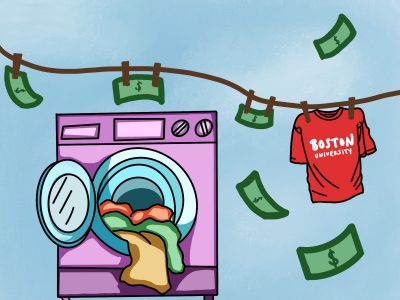Launched in late November 2020, Boston University’s Young Democratic Socialists decided to pursue a challenge with a simple goal — get free laundry for students on campus. What this promising future meant for the undergraduate BU community was a world where quarters are a thing of the past and basic hygiene becomes a right and not a necessary financial burden.
So, with an Instagram infographic, a petition and a lot of optimism, we dove right in. What we ended up finding was the disappointing reality of our place on the BU hierarchy as students and the effectiveness of student activism.
Part of what attracted BU YDSA to starting this campaign was its ability to garner support across the board. It didn’t matter where you were on the political spectrum, free laundry was something that affected and benefited all students. The idea was that this was an easy victory that could pave the way for students to have a seat at the table for more high-stakes, less universally applicable negotiations.
Winning laundry meant the door was open to help increase wages for student employees, strike for lower tuition and create more accessible mental health services. With a victory under BU YDSA’s belt we would have credibility as an organization that successfully fights for the interests of the BU community. Trust builds solidarity, and solidarity leads to change.
We put up a good fight and students were excited to see where the campaign would take us. Over my tenure on the BU YDSA executive board — first as treasurer, then as vice president, and now as president — I’ve seen us rightfully earn the moniker of “the free laundry people.” But flash forward to now, after many catchy poster designs, countless back-and-forths with the administration, a protest, a sit-in and almost 3,000 student signatures — I’m constantly asked by students, “What the heck happened?”
What we never announced on social media was that, on Nov. 4, nearly a year after we started our campaign, we agreed as an organization in a majority vote that it was time to table free laundry and pour all of our energy into building up labor solidarity instead.

In our post-mortem reflection, we dissected what went wrong and what we could have done differently. What I ended up realizing was that free laundry’s biggest pull also happened to be its biggest obstacle.
On the one hand, what drew people into the campaign was its applicability. If you live on campus, you’ve had to experience paying for laundry, and you understand how much that sucks. This is the part that got students excited, regardless of their financial situation.
However, BU boasts of $329.5 million in aid awarded to undergraduates. If you calculate the estimated cost of attendance for those near 16,000 students, the total amounts to over $1.2 billion in revenue. All of a sudden, that $329.5 million doesn’t seem nearly as significant.
What this means for the various financial situations of BU students is that a big chunk of students don’t require severe financial assistance.
Depending on socioeconomic status, laundry costs could range from simply being a tedious chore for some to a financially crippling choice between basic needs for others. In the context of BU students, we can see that more people’s finances are likely to land them closer to the “tedious” side of the laundry spectrum than “crippling.”
Is laundry a universal chore that the administration has the ability to make more equitable for students by subsidizing costs? Yes. But is it a universal, debilitating struggle that ruins people’s ability to function on campus? Debatable.
It is difficult to continue mobilizing students to act when the stakes are so low, and we struggled to justify taking more aggressive measures knowing that if turnout wasn’t high, we risked the safety of our members and the credibility of our organization.
What I found is that our position as students gives us very little existing leverage with the administration. Tuition is a sunk cost, we don’t have labor to withhold and at a school as competitive as BU, there is no shortage of applicants to replace disruptive students fighting for change.
Although we weren’t able to reach our end goal, the fight was a good one. We learned how to organize, grab people’s attention and communicate with people in power. The “Free Laundry Campaign” wasn’t so much a loss as it was a message to BU students on the administration’s priorities.
3,000 signatures, and the answer was no. Endorsements from BU College Democrats, The Environmental Student Organization, Action BU, BU Student Immigrant Alliance, CAS Anti-Racist Initiative and the BU Student Goverment, and the answer was still no.
Even when the stakes were this low, their answer was always going to be no.
Although the laundry campaign is over, student activism doesn’t end here. There was a recognizable flaw in the scalability of free laundry, but it drew attention to how little student consensus mattered to our administration making material change. None of that work mattered to them. This should make you angry. This is fuel to work harder. This is ammo we must use to continue fighting for a more equitable campus, not just for students but for our faculty, our staff and our working-class communities.























































































































